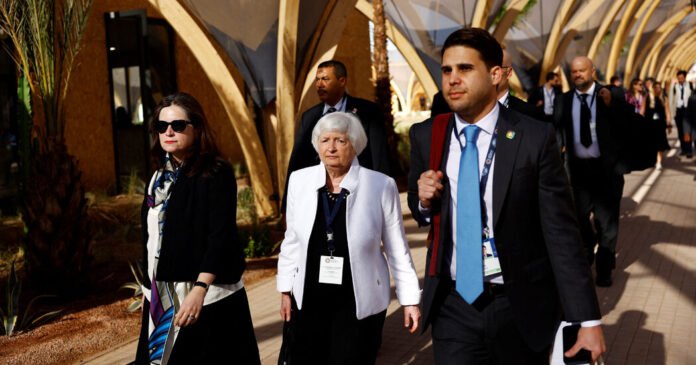Treasury Secretary Janet L. Yellen said Wednesday that the war between Israel and Gaza is a potential problem for the global economy and suggested that more U.S. sanctions could be imposed in response to Hamas’ attack on Israel.
Questions about the war’s economic impact grew as Ms. Yellen vigorously defended Israel and rejected the idea that U.S. sanctions on Iran – a key backer of Hamas – had become too lenient. Ms. Yellen said the Treasury Department continues to review its sanctions against Iran, Hamas and Hezbollah, the Lebanese militant group that is also a long-time foe of Israel.
“We have not eased our sanctions on Iranian oil in any way,” Ms. Yellen said at a news conference on the sidelines of the annual meetings of the International Monetary Fund and the World Bank in Marrakesh, Morocco. “We have sanctions against Hamas and Hezbollah, and that is something we are constantly monitoring and using the information as it becomes available to tighten sanctions.”
She added: “We will continue to do that.”
The Treasury secretary also did not rule out reversing a decision made last month – to release $6 billion in Iranian funds in exchange for the release of American hostages – if Iran is found to have been involved in the Hamas attack.
At the time of the exchange, the United States told Iran that it had transferred about $6 billion in Iranian oil revenues from South Korea to a bank account in Qatar. The money should only be used for food, medicine and other humanitarian goods.
“These are funds that are in Qatar and have been made available solely for humanitarian purposes, and the funds have not been touched,” Ms. Yellen said, adding: “I would not take anything off the table in terms of future possible actions.” “
The crisis in Israel poses a new challenge for the global economy and the Biden administration, which has spent the last year battling inflation in the United States and reining in energy prices that have become volatile because of Russia’s war in Ukraine . Another war in the Middle East complicates these efforts by threatening to restrict oil supplies and drive up prices.
Ms. Yellen said geopolitical “shocks” continued to pose risks to the global economic outlook.
“Of course, the situation in Israel raises additional concerns,” she said.
Business officials across the Biden administration are closely monitoring developments in global oil markets this week. Global oil prices jumped on Monday following the terrorist attacks in Israel, but fell slightly on Wednesday. Administration officials worry that a continued rise in crude oil prices could hurt economic growth and hurt Mr. Biden’s approval ratings by driving up gasoline prices for American drivers.
Ms. Yellen said she continued to believe the U.S. economy could achieve a so-called soft landing – in which inflation eases without a recession – but was watching closely to see whether any economic fallout could arise from the new conflict in the Middle East.
“While we monitor the potential economic impact of the crisis, I do not believe it is a material factor in the global economic outlook,” Ms. Yellen said. “We’ll see what impact it has. So far I don’t think we’ve seen anything that suggests it will be of much importance.”
International policymakers gathered in Morocco for a week of meetings as the global economic recovery loses momentum. The prospect of a new regional conflict gave other policymakers more cause for concern about a sluggish global economy that has been battered by war, pandemic and inflation in recent years. Central banks around the world have been raising interest rates to curb rapid inflation, and investors had begun to hope that a recent slowdown in price increases could signal an end to those hikes.
“I think central bank governors are concerned about what might happen to energy prices if the Israel-Gaza conflict develops into a larger regional conflict and impacts oil supplies in the markets,” said Gita Gopinath, first deputy chief executive the central bank IMF said in an interview on Wednesday.
Ms. Gopinath added that higher oil prices could push prices higher more broadly, making interest rate decisions more difficult for central bankers. She noted that it was too early to tell how the economic impact of the conflict in the Middle East would compare to the impact of the war in Ukraine, but that overlapping crises presented a headwind.
“The geopolitical risks are certainly piling up with the Russian invasion of Ukraine and we are now seeing them in Israel and Gaza,” she said.
That sentiment was echoed on Wednesday by World Bank President Ajay Banga, who told a news conference that he now expects interest rates to be “higher for longer,” despite signs that inflation is cooling.
“I believe that wars present a complete and utter challenge to central banks trying to find their way out of a very difficult situation,” Banga said.
It is not yet clear what steps the Biden administration would take to rein in oil prices if the war between Israel and Gaza intensifies, or how that might affect its efforts to curb Russia’s oil revenues.
Ms. Yellen suggested on Wednesday that the “price cap” policy developed by the Group of Seven last year, which bans Russia from selling oil above $60 a barrel through Western banking and insurance services, had been successful.
“Global energy prices have remained largely unchanged, while Russia has had to either sell oil at a significant discount or spend huge amounts on its alternative ecosystem,” she said.
Jim Tankersley contributed reporting from Washington.


















